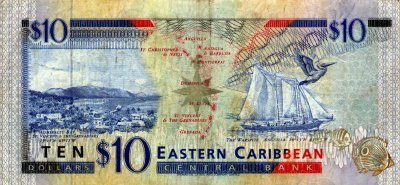

Banks and Currency
Banks are generally open Monday through Thursday from 8 a.m. to 1 p.m. and on Friday from 8 a.m. to noon and 3 p.m. to 5 p.m. Currency is the Eastern Caribbean dollar; U.S. currency is widely accepted.
Eastern Caribbean NoteClimate
Year-round temperatures range from 65 to 95 degrees (Fahrenheit).
Click here for current weather information
All visitors will need a valid passport in addition to a return ticket off the island.
Dress
Attire on St. Lucia is resort casual. Swimwear and short-shorts are appropriate only on the beach, not in town. In the evenings, men and women tend to dress up a little--especially in the larger hotels and resorts. Jacket and tie is sometimes required, mostly in the finer resorts and restaurants during the winter season.
Drinking Water
St. Lucia's water is safe to drink.
Electricity
220-230 volts, 50 cycles a.c.; North American appliances require a transformer and an adapter.
Government
Since February 22, 1979, St. Lucia has been an independent state within the British Commonwealth. The island's government is led by a resident governor-general, who is designated by the Queen.
Flag of St. LuciaHolidays
New Year's Day, Independence Day (February 22), Good Friday, Easter, Easter Monday, Labor Day (May 1), Whitsuntide (in June), Corpus Christi (in June), Emancipation Day (first Monday in August), Thanksgiving Day (first Monday in October), National Day (December 13), Christmas Day, and Boxing Day (December 26).
Language
English is the official language but a local patois, which is French-based, is also spoken.
Population
174,000 as of 2012
St. Lucia had a population density of approximately 227 inhabitants per square kilometer in the late 1980s, almost evenly dispersed between urban and rural areas. This pattern was expected to change, however, because limited amounts of arable land caused residents to migrate to the cities and towns. The Pan American Health Organization (PAHO) estimated that there was a net annual internal migration to Castries of approximately 0.8 percent in 1984. This trend was expected to continue into the foreseeable future and to place the greatest burden on Castries and Vieux Fort.
St. Lucia's rapidly increasing population, caused by the country's young population and high fertility rate, placed an enormous stress on the society, which was already experiencing underemployment, a growing informal economic sector, and increased pressure on livable space in urban areas. Although emigration might ameliorate the population problem, observers in the 1980s believed that the government might have to develop a national birth control program similar to those in other Eastern Caribbean islands.This linguistic dualism originated in the colonial period when St. Lucia was under the alternating stewardship of France and Britain. Linguistic influences at this time included those of the two European states, as well as the numerous African languages used by the slave population. The development of patois during the slavery period served two purposes. It facilitated communication between the French and slave populations, as well as among the various ethnolinguistic African groups who often did not share a common language. Until St. Lucia became British, French and patois coexisted harmoniously and were used interchangeably by the middle and upper classes; the uneducated, however, particularly the slave population, communicated only in patois.
The British, as the dominant social, political, and economic group in the nineteenth and twentieth centuries, replaced French with English as the official language. English, however, lacked the common roots that French shared with patois, causing a clash of languages and cultures that previously had not existed. Although patois was replaced by English over time, it was still employed in some ceremonial functions. However, because patois continued to be associated with a sense of vulgarity and lack of culture and education, many St. Lucians hid their ability to communicate in it.
The effect of language on social status was still very pronounced. Those elements that did not speak English, comprising approximately 20 percent of the population, were excluded from the education system and hence unable to participate fully in political, economic, and social power sharing. The St. Lucian government recognized the problem and was attempting to incorporate this minority into the mainstream of society through language outreach programs. An improved infrastructure, especially an island-wide road network, was also bridging the gap between these two groups.
Observers believed that with time, English would be spoken by virtually the entire population, and as a result patois probably would become less influential even among the French descendants on the island. Nevertheless, it appeared unlikely that patois would disappear completely, given the fact that it was a symbol of cultural identity for many St. Lucians.
Source: U.S. Library of Congress
Introduction to St. Lucia
![]() Sightseeing
Sightseeing
![]() Activities in St. Lucia
Activities in St. Lucia
![]() Fast Facts
Fast Facts
![]() Travel Info
Travel Info
![]() St. Lucia Photo Gallery
St. Lucia Photo Gallery
![]() Contact Us
Contact Us
![]() LukeTravels.com Home
Page
LukeTravels.com Home
Page
![]() Air & Hotel Deals
Air & Hotel Deals
![]() Advertise Here
Advertise Here
COPYRIGHT 2009-2012 © LUKETRAVELS.COM ALL RIGHTS RESERVED - GO TO LUKETRAVELS.COM HOME - CONTACT US

